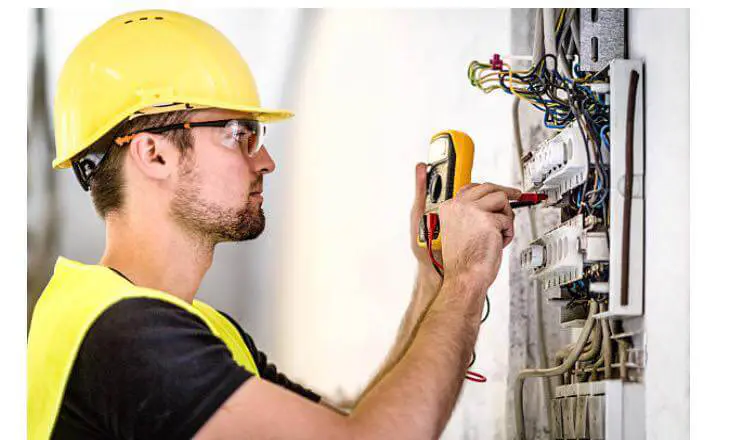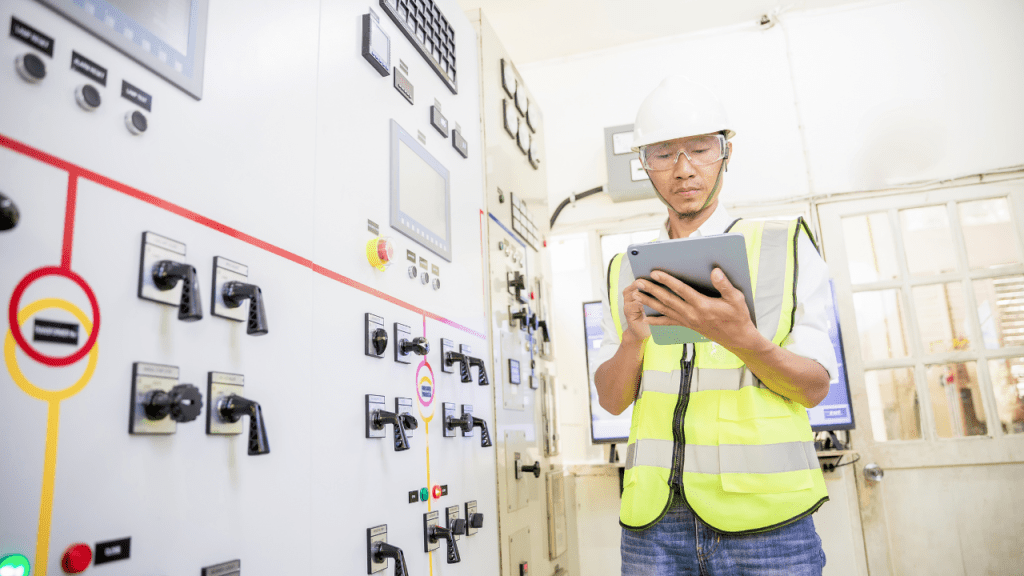Did you know that approximately 20% of electrical fires in the UK are caused by faulty wiring or appliances? Understanding where to find your EICR certificate is crucial for ensuring the safety of your home.

Let’s explore the importance of this document and how knowing its whereabouts can make a significant difference in safeguarding your property and loved ones.
Understanding Electrical Safety Certificates
To ensure the safety and compliance of electrical installations, obtaining an Electrical Safety Certificate, also known as an Electrical Installation Condition Report (EICR), is imperative. The importance and benefits of this certificate can’t be overstated. It serves as a verification of the safety and compliance of electrical systems in both residential and commercial settings.
The inspection process involves hiring a qualified electrician registered with a competent person scheme to assess the property thoroughly. During the inspection, common faults such as faulty wiring, overloading, and outdated components are identified.
Landlords have a legal obligation to ensure that electrical installations are safe and must conduct inspections every 5 years. Tenants, on the other hand, have the right to request and view the EICR certificates from landlords to ensure their safety.
Safety precautions must be taken seriously to prevent electrical hazards and protect both tenants and property. Prioritizing EICR certificates is key to maintaining safety standards and preventing electrical accidents and fires.
Obtaining an Electrical Safety Certificate
When obtaining an Electrical Safety Certificate, a qualified electrician registered with a competent person scheme will conduct a thorough inspection of the property. The inspection process involves assessing the electrical installations to ensure they meet safety standards and comply with regulations. Qualified electricians are trained to identify potential hazards, faults, and areas of non-compliance. Through this process, compliance verification is achieved, providing assurance that the property is safe for occupants. Additionally, fire risk assessments are integrated into the inspection to mitigate potential fire hazards.
To enhance accessibility, many providers now offer online platforms for managing and accessing certificates. These platforms allow homeowners and landlords to easily download and store their Electrical Safety Certificates digitally. By embracing online accessibility, individuals can conveniently retrieve their certificates whenever needed.
Prioritizing fire safety and risk assessments in conjunction with obtaining Electrical Safety Certificates is crucial for maintaining a secure environment.
Locating and Managing Certificates Online

Navigating online platforms for managing and accessing certificates offers a convenient solution for homeowners and landlords seeking to store their Electrical Safety Certificates digitally. To efficiently handle certificates online, consider using dedicated mobile applications or platforms provided by utility services for easy access.
Ensure that the electrician issuing the certificate is a competent person registered with a recognized scheme to uphold safety standards. When utilizing online services, prioritize authenticity verification to guarantee the credibility of the platform. Remember to avoid common pitfalls such as neglecting expiry dates, utilizing insecure platforms, or failing to verify the legitimacy of the digital certificate.
Fire Safety and Risk Assessments
Conducting a thorough fire risk assessment is imperative for ensuring safety compliance in all types of establishments. Identifying hazards is a critical step in this process, as it allows for the evaluation of potential risks that could lead to fire incidents.
By meticulously examining the environment, equipment, and procedures in place, one can pinpoint areas of concern and take proactive measures to mitigate them. Developing comprehensive emergency plans is equally essential to ensure a swift and effective response in case of a fire emergency.
These plans should outline evacuation procedures, designate emergency exits, and establish communication protocols to guarantee the safety of occupants. Regularly reviewing and updating the fire risk assessment and emergency plans is crucial to adapt to any changes in the environment or operations, maintaining a high level of safety compliance.
Legal Requirements and Responsibilities

Ensuring compliance with electrical inspection regulations is a fundamental responsibility for landlords in England, Scotland, and soon in Wales. It’s of utmost importance to adhere to Part P regulations to guarantee safety and legal compliance.
Regular inspections are mandatory to identify and address potential hazards within electrical installations. Landlords must prioritize obtaining Electrical Installation Condition Reports (EICRs) to verify the safety of their properties. EICRs play a vital role in preventing electrical accidents and fires by assessing the condition of electrical systems.
Landlords should understand that failure to comply with inspection requirements can result in penalties. Communication, safety maintenance, and consumer rights play key roles in ensuring that properties meet required safety standards. Reporting procedures must be followed diligently, and certificate validity should be verified to maintain electrical safety in properties.
Consumer Awareness and Rights
Tenants should actively seek EICR certificates from landlords to uphold their rights regarding electrical safety. It’s essential for consumers to be aware of their rights, ensuring landlords comply with regulatory requirements.
Landlords have obligations to conduct regular inspections and provide valid EICR certificates to tenants. This compliance is crucial for maintaining safety standards and preventing electrical hazards.
Consumers play a significant role in ensuring their safety by requesting and verifying these certificates. Empowering consumers with knowledge about safety standards and the inspection process enhances their ability to report any non-compliance to the appropriate authorities.
By fostering a culture of consumer awareness, individuals can actively participate in maintaining electrical safety within their living spaces. Effective communication and cooperation between tenants and landlords are fundamental for upholding safety standards and regulatory compliance.
Frequently Asked Questions
How Long Does an EICR Certificate Typically Remain Valid Before Requiring a New Inspection?
Typically, an EICR certificate remains valid for 5 years before requiring renewal through a new inspection. This process ensures compliance with safety standards, identifies common issues, and may vary in cost based on property size and complexity.
Are There Any Specific Qualifications or Certifications That an Electrician Must Possess to Conduct an EICR Inspection?
To conduct an EICR inspection, electricians must possess qualifications like City & Guilds 18th Edition. Certification requirements include being registered with a competent person scheme. Inspections follow strict safety standards, compliance regulations, demonstrating professional expertise.
Can Landlords Charge Tenants for the Cost of Obtaining an EICR Certificate?
As a tenant, landlords cannot charge for EICR certificates. Landlords are responsible for covering EICR costs. Failure to comply with regulations may lead to legal disputes. Upholding fair practices, transparency, and tenant protections is essential.
Are There Any Situations Where an EICR Inspection May Need to Be Conducted More Frequently Than Every 5 Years?
In certain circumstances, EICR inspections might need more frequent scheduling, especially in commercial properties, high-risk environments, older buildings, change in occupancy, or for safety concerns. These exceptions ensure ongoing electrical safety standards.
What Are the Potential Consequences for a Landlord Who Fails to Provide Tenants With a Copy of the EICR Certificate Upon Request?
Failing to provide tenants with an EICR certificate upon request can have legal implications for landlords. It infringes on tenant rights, raises safety concerns, and violates documentation requirements. Landlords must prioritize fulfilling inspection responsibilities to avoid penalties.
Conclusion
In conclusion, maintaining a safe electrical environment in your property is crucial for the well-being of yourself and others.
By understanding where to find your EICR certificate, obtaining necessary inspections, and staying informed about legal requirements, you can ensure compliance and prevent potential hazards.
Prioritizing electrical safety through proactive measures and awareness empowers you to create a secure living space for all occupants.









